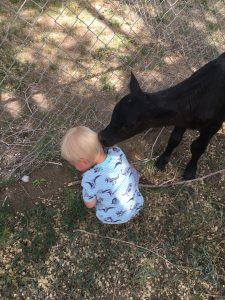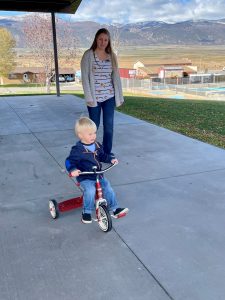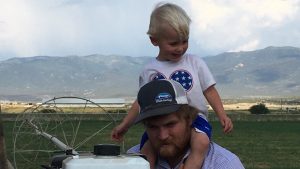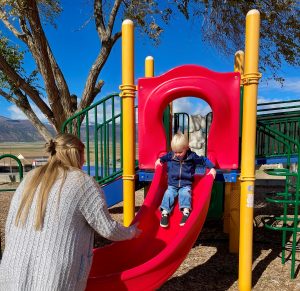Central Utah toddler makes remarkable progress after groundbreaking gene replacement therapy
Nov 27, 2021, 1:20 PM | Updated: 1:24 pm
A Central Utah toddler is doing something remarkable.
Born with a life-threatening condition, he was given a groundbreaking therapy. Now, he’s making progress unimaginable even a few short years ago.
At first glance, you’d think the Wight family hasn’t a care in the world.
Two-year-old Cinch was named for a strap that binds a saddle to a horse.

Cinch Wight loves helping his dad with the sprinklers and with the cows. None of these things would have been possible without gene replacement therapy. (Used with permission: Amber Wight)
“That goes under the belly and you cinch it up and keeps the saddle,” said Amber Wight, Cinch’s mom, who lives in Central Utah.
A “cinch” is also “a thing done with ease.” But his life was almost anything but.
“I was having a hard time with it. I just kind of hopeless, actually,” said Alex Wight, Cinch’s dad.
Newborn screenings showed Cinch has spinal muscular atrophy, or SMA, which paralyzes a baby in the first few weeks or months of life. Many babies with SMA don’t survive to their second birthday, but the day after Cinch was born, the U.S. Food & Drug Administration approved a new therapy.
Cinch was one of the first to receive it.
“This really lets him live like a normal little two year old,” said Dr. Russell Butterfield, a pediatric neurologist with University of Utah Health and Intermountain Primary Children’s Hospital.

Cinch loves riding his bike and playing at a park near his house. His parents say they don’t take a single moment of his good health for granted. (Heather Simonsen, KSL TV)
He said the treatment is a game-changer for kids like Cinch.
“It just feels good to see the outcome and it’s hard to be patient for it,” Dr. Butterfield said. “When we first treated him and he’s two weeks old, we just wait and wait and wait. And then it’s fun to now see him walking around and talking.”
In a single infusion, a virus delivered a new copy of the gene into the Cinch’s nerves. With help from insurance and Primary Children’s Hospital, Cinch got the $2.1 million gene replacement therapy.
“We were always their top priority to make sure we felt comfortable were having a good experience there,” said Amber Wight. “They have been 100% Amazing. I cannot imagine any other team to have helped us through.”
Doctors say Cinch is reaching all his developmental milestones. Because of gene replacement therapy, Cinch is living the life his parents dreamed for him.
“He comes out and helps me move sprinklers and you know, kind of hangs out with me doing farm work and little bit with the cows,” Alex Wight said. “But right now, he just likes running through a field.”

Cinch Wight loves helping his dad with the sprinklers and with the cows. None of these things would have been possible without gene replacement therapy. (Used with permission: Amber Wight)
It’s a life that didn’t seem possible after the initial diagnosis. Though there are no guarantees, his parents are hopeful, and grateful.
“A mother’s dream is for him to walk or do the simple things, you know, and so he’s done that and more,” Amber Wight said. “We just accept every day and are very thankful that he can do what other kids his age can do. Other kids won’t know that he has this and he won’t be looked at differently.
Alex Wight said, “I’m just wanting him to have a good life and you know, be able to help me around the farm and ranch. I just hope that he enjoys every moment.”

Cinch loves riding his bike and playing at a park near his house. His parents say they don’t take a single moment of his good health for granted. (Heather Simonsen, KSL TV)
And it turns, with all this progress, his name, Cinch, means even more to his parents now.
“He’s kind of holding us up,” Amber Wight said. “He fits his name.”
An identity that defines him, while his disease does not.












